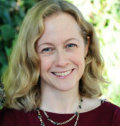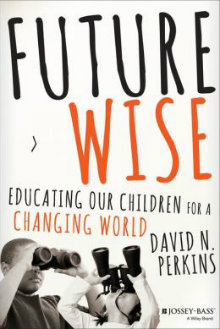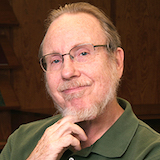Educating Our Children for a Changing World
Future Wise: Educating Our Children for a Changing World
By David N. Perkins
(Jossey-Bass, 2014 – Learn more)

If you could watch a class taught by David N. Perkins, Harvard’s Project Zero cofounder and author of Future Wise: Educating Our Children for a Changing World, it would likely be full of questions, and he wouldn’t give all the answers.
Can you explain how you found that solution?
What do you find interesting about quadratic equations? How about the French Revolution?
“What if we reframed the study of quadratic equations to be part of looking at models of growth and loss?”
And, the kicker: “What did you learn during your first twelve years of education that matters in your life today?”
In other words: What’s worth learning in school?

Uncovering lifeworthy learning
Perkins calls important learning that one can use later lifeworthy, a term that encompasses both hands-on practical learning and more abstract appreciation of ideas.
Much of what we put on lists of standards or hope to “cover” in the course of a year, or an education, can be fleeting and unmemorable. Yes, studying such content builds skills, but can we do better? Can we teach discipline-relevant content, while also practicing skills, while also striving for connections between and beyond disciplines?
Among many suggestions, Perkins mentions infusion, an umbrella term for constructivist approaches that “advocate infusing the teaching of thinking into the teaching of content.” Yet this is not just a book about skill building. Perkins equally wants us to encourage students to “go down the rabbit-hole” of deep knowledge about topics that matter.
The impractical practicals
And the book is not strictly utilitarian by any means. Perkins devotes a beautiful chapter to the importance of the “impractical practical,” such as poetry:
Perhaps it’s worth distinguishing between the practical practical and the impractical practical. The practical practical treats repairing tires, preparing for job interviews, and checking for termites in the house you’re considering buying. The impractical practical concerns how one engages the world, its arts, its people, its history, its future, its larger miseries and hopes. A considerable portion of our lives and much of the quality of life has to do with the impractical practical, so it’s not all that impractical. You might want ‘Ulysses’ and some of its kin in your tool kit along with a jack and a tire iron.”
His description sent me back to Alfred, Lord Tennyson’s “Ulysses,” with its yearning “To follow knowledge like a sinking star,/Beyond the utmost bound of human thought.”
Trying to describe Future Wise in full is like scooping jello from a bucket with your hands. It is astonishingly comprehensive in imagining how to pick topics that will lead to major understandings and in choosing “bucket systems,” broad structures of looking at the world, that will help facilitate such understandings.
Choosing content via “smart sampling”
Perkins also describes concrete ways that school districts or national groups might choose the content to be taught. One such flexible method is “smart sampling,” which “typically involves some broad group designating high-priority topics and maybe some musts but with latitude for local decision making about which to select and whether to range beyond the suggestions.”
“This,” Perkins says, “provides both reasonable coherence and fertile flexibility,” an echo of the recent revisions of Advanced Placement tests ranging from U.S. History to Biology.
Perkins freely admits he will not answer the question of what is worth learning; instead, he gives a panoply of ways people have answered it already and might answer it in the future.
Sparking discussions with your colleagues
Along the way, he includes vignettes on teaching philosophy that you could incorporate right away into a discussion with colleagues or your department head. His analysis of good and bad projects, in the context of lifeready learning that can be applied to the world outside the classroom, could be the basis of an entire semester’s exploration of assessments:
Project-based learning, problem-based learning, and so on are not quite plug-in solutions to the challenge of lifeready learning. Educators have to get the details right. For instance, some projects are overly structured. Students are told exactly what to do in the spirit of ensuring success, but then they get no experience of searching out conceptual tools or homing in on particular cases of application. Also, much of learners’ time may go to managing aspects of the project extraneous to the principal learning goals…. Sometimes students tackle projects based on technology where they spend most of their time struggling to get the technology to work, a technical problem extraneous to the real learning goals.”
All of these problems are intimately familiar to classroom teachers.
We can only imagine that Perkins was a curious child. Midway through the book, he tells a story from 1944 physics Nobel Prize winner Isidor Rabi describing “how most mothers in his circle asked their children when they got home from school, ‘Did you learn anything today?’ But Rabi’s mother would ask him, ‘Izzy, did you ask a good question today?’”
Reading this book will make you want to design methods and structures that inspire every child to ask a good question today. As Perkins notes, “it’s worth remembering that in the Socratic tradition, sometimes the mission of a question is to unsettle rather than settle, at least for a while.”
Profoundly unsettling in the best way
This book is profoundly unsettling in the best way, simply because it gives so many expansive possibilities for making every minute of a student’s day relevant. The only problem is choosing which to embrace and when to start.
And I’m curious how you would answer Perkins’ question: “What did you learn during your first twelve years of education that matters in your life today?”
As Perkins muses at the end, “Maybe a reasonable aspiration for education, even pre-university education, is not so much wisdom but knowledge on the way to wisdom.”
What wisdom did you gain from your K-12 schooling, and what do you hope your students take with them as well?
Sarah Cooper teaches eighth-grade U.S. history and is co-dean of faculty at Flintridge Preparatory School in La Canada, California. She lives just outside Los Angeles with her husband and two sons, both in elementary school. She is the author of Making History Mine (Stenhouse, 2009) and writes and reviews books for MiddleWeb.































